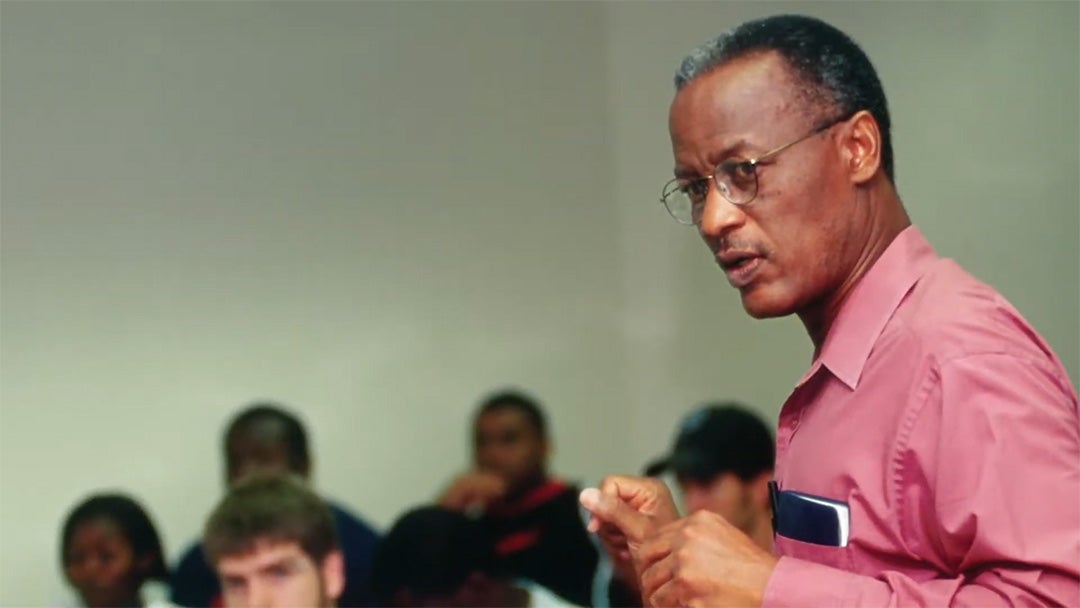
Rice University is mourning the loss of Edward Cox, professor emeritus of history, who passed away at the age of 81. A beloved educator, mentor and scholar, Cox left an indelible mark on the university and the many students he guided over his 27-year tenure.
"Edward's passion for diversity and history and commitment to excellence in teaching and research was evident throughout his service at Rice,” said Provost Amy Dittmar. “His positive influence is immeasurable and will be felt at Rice and universities nationwide for decades."
“Edward Cox was a cornerstone of our community,” said Kathleen Canning, dean of the School of Humanities. “His passion for teaching and his unwavering support of students from all walks of life made Rice a better place. His influence will be felt for generations to come.”

That’s evident in stories from students-turned-colleagues such as Alexander Byrd and Fay Yarbrough, who reflected on Cox’s impact at Rice, both in and out of the classroom.
“Through his teaching, mentoring, advocacy and tireless capacity building, Edward Cox helped to lead the university — in a quiet, unrelenting way — to its present summit as a place for everyone and as the best it has ever been precisely because it now strives to be a place for everyone,” said Byrd, Rice’s vice provost of diversity, equity and inclusion. “Some of Dr. Cox’s most important work at Rice emerged out of his teaching. He was a phenomenal instructor, known for the great care he took with his students and for the tremendous passion with which he taught. In any course of Dr. Cox’s, there would be days when folks left wiping their eyes.”
Yarbrough, professor of history and associate dean of faculty and graduate programs, called Cox her “Rice dad” due to his mentorship, which began when he became her undergraduate adviser and continued as she pursued her doctorate, positions at other universities and a position at her alma mater when she ultimately returned to Rice to teach alongside him.
“He has mentored countless students, shared meals with students as an associate at Wiess and Martel Colleges and extended the hospitality of Caribbean home cooking by inviting students to meals in his own home,” Yarbrough said. “I watched as he unashamedly choked up when talking about enslaved children in our course Blacks in the Americas. Others can speak to what Ed has done for Rice University; I know that I am selfishly talking about what Ed did for me, and I know Ed did this for many students: He made us feel exceptional.”
Cox’s contributions were numerous. He was a member of the steering committee for the Task Force on Slavery, Segregation and Racial Injustice and a four-time recipient of the George R. Brown Prize for Excellence in Teaching. His commitment to diversity and inclusion was evident in his 22 years of service as a faculty sponsor for the Black Student Association and his role as founding director of Rice’s Mellon Mays Undergraduate Fellowship program, which nurtured minority students pursuing doctoral degrees. In 2018, he was honored with Rice’s Meritorious Service Award, recognizing his years of dedicated service to the university.
“It is safe to say that Edward Cox was one of the founders of the university we now enjoy and take such great pride in today,” said Caleb McDaniel, the Mary Gibbs Jones Professor of Humanities and professor of history.
Born in Grenada in 1943, Cox’s academic journey began early. By the age of 20, he was already teaching history at Grenada Boys’ Secondary School. He earned his bachelor’s degree from the University of the West Indies before moving to the United States to complete his master’s and doctoral degrees at Johns Hopkins University. Throughout his career, Cox’s research focused on Caribbean history, particularly New World slavery, race relations and civil rights. His book “The Free Coloreds in the Slave Societies of St. Kitts and Grenada 1763-1833” is regarded as a significant contribution to the field.

As a professor at Rice, Cox was more than just a scholar — he was a mentor who inspired countless students to pursue their passions. One nomination for the George R. Brown Prize highlighted Cox’s teaching style: “His ability to cultivate in all students a love for learning while also helping them to develop confidence in themselves and their work is rare.”
“While I never had the opportunity to participate in any of Ed Cox’s classes, he ironically participated in one of mine,” said Jan West, assistant director of Rice’s multicultural community relations. “I had the audacity to invite this talented scholar to judge a debate conducted by my fifth graders at a Catholic school in Third Ward. He readily agreed to come. His presence inspired the youngsters to do an extraordinary job. What I most remember about that day, however, is that Ed in his humility and humanity shed tears of appreciation that conveyed to the students that he valued their intelligence and work.”
Beyond his service at Rice, Cox remained connected to his roots in the Caribbean. His research expanded into the social and economic histories of Grenada and the Grenadines. He authored more than 30 publications with notable works such as “Rekindling the Ancestral Memory: King Ja Ja of Opobo in St. Vincent & Barbados, 1888-1891.”
“Professor Cox established the foundation for excellence in Caribbean and Atlantic World history at Rice,” said Nathan Citino, chair of the Department of History. “Even more importantly, he was a gracious colleague, teacher and mentor. His contributions over more than 25 years helped to make the history department what it is today.”
A celebration of Cox’s life is planned for Oct. 12 at 11 a.m. at Saint James Episcopal Church. In lieu of flowers, the family suggests that donations be directed to the church’s Althea Gibson Scholarship Fund.

